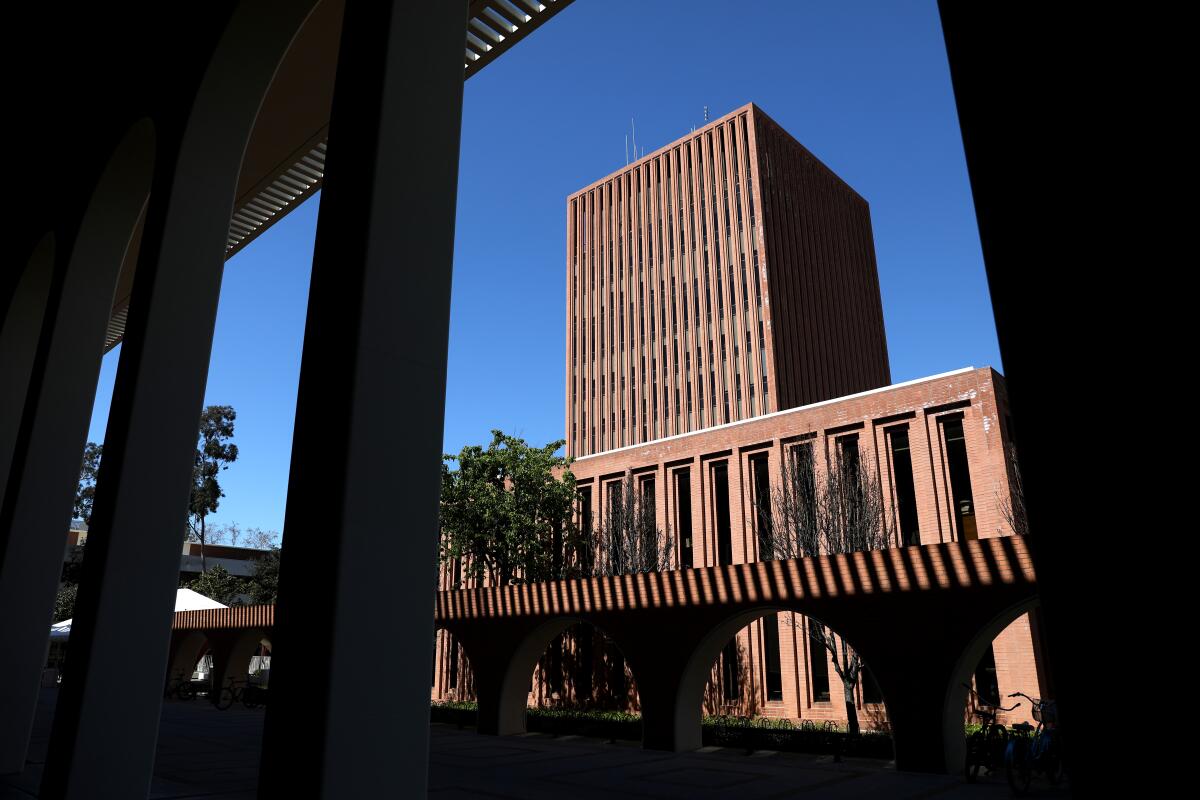USC cuts ties to controversial online degree company 2U

- Share via
The University of Southern California has cut ties with a controversial online education company that ballooned its social work school’s enrollment to the largest in the world but harmed the program’s finances and academic reputation.
The university and the for-profit company, 2U Inc., said in a joint statement this week that they “mutually agreed to conclude our relationship” for degree programs at USC’s social work school, education school and the university’s entrepreneurship program, Iovine and Young Academy.
Over the next 15 months, USC will take over operations of the online programs and run them in-house, a move that will give the university full control over its programs and tuition revenue. Previously, 2U ate up more than half of USC’s online tuition dollars and contributed to a budget crisis at the social work school, The Times has reported.
During this period, then-social work dean Marilyn Flynn committed what she later acknowledged was bribery to local politician Mark Ridley-Thomas to shore up the school’s shaky finances by securing government contract money. Flynn pleaded guilty last year and was sentenced to probation.
The terms of USC’s separation from 2U were not disclosed, but the chief executive of 2U, Chip Paucek, told investors Friday that the company would receive about $40 million from the university in the fourth quarter of 2023 in connection with the end of its USC relationship.
Asked to confirm the $40-million sum stated by Paucek, USC declined.
The university’s exit was an enormous blow to the Maryland-based 2U. USC was the first school to sign on with the start-up 13 years ago. 2U donated $2.5 million to endow a chair for Flynn, and after the company went public, she touted its benefits to investors. Even Paucek’s wife earned a master’s degree in education at USC.
The university remained important to 2U’s bottom line even as it rolled out degree programs at public and private educational institutions around the world, eventually contracting with more than 200 of them. Company share prices plummeted about 60% on Friday, to about $1 per share.
On campus, administrators and faculty welcomed the split with 2U. (The company will continue facilitating a physical therapy program.) The model had driven the social work school to recruit more and more students to cover overhead. Even after raising tuition to more than $100,000 and swelling enrollment from 900 to 5,000, the school could not make ends meet. A 2019 budget crisis led to a wave of layoffs and doubts about the school’s future.
Vassilios Papadopoulos, interim dean of USC’s school of social work for the last 18 months, said when he initially studied the school’s books, it seemed clear the only way forward was ending the relationship with 2U.
“Thirteen years ago, it was a great thing, but times change, technology changes,” Papadopolous said of the 2U partnership. Then, USC offered the nation’s only online master’s degree in social work. Now there are dozens throughout the country — at prices that are often far cheaper.
In recent years, administrators have pushed to overhaul the school and make it more affordable, slashing tuition by 25% in 2022. Enrollment has now fallen to 1,000, and Papadopolous said the school is focused on quality over quantity.
“Growth is not really the big vision here,” he said.
Online education will remain a priority at USC, but run within the university. Its staff was able to develop and operate its own online programs that did not require revenue sharing with 2U. The COVID-19 pandemic supercharged those efforts as faculty embraced distance learning and the price of buying and customizing technology continued to fall. But the 2U contracts limited how much the university could do on its own.
Those agreements contained a “poison tail,” which obligated USC to continue handing over its revenue share for two years after canceling, The Times has reported.
The Rossier School of Education used 2U to offer three master’s programs and one doctoral degree.
Pedro Noguera, an education policy expert and dean of USC’s education school, said the leaps forward in technology made it difficult to justify the company’s fees.
“They’re going to probably be in jeopardy unless they figure out ways to maneuver,” Noguera said of 2U. “That’s true in many tech companies, and I think 2U is going to be faced with that right now.”
2U declined to make executives available for interviews.
Paucek, the longtime CEO, acknowledged the importance of the L.A. university to his business in 2017, saying, “You can argue that 2U wouldn’t exist without USC.” On a call with investors Friday, he said that “ultimately, the programs we agreed to exit [from USC] no longer align with our platform strategy.”
Noguera said the education school did not face financial hardship from its online learning contract, but he said that ending the 2U relationship still delivered benefits.
“The main benefit is it gives us the ability to expand and to make changes in the way we design our programs without having to work through it with our partner, because we have control,” he said.
Administrators emphasized that students will not see differences in how they attend courses online and that the academic content will remain the same.
Faculty and staff at USC were widely pleased with the move.
“Calling it a ‘relief’ is maybe too strong. But I would say we are happy about the separation,” Noguera said.
Papadopolous said that after the announcement went out to faculty, he received “very positive messages.”
More to Read
Sign up for Essential California
The most important California stories and recommendations in your inbox every morning.
You may occasionally receive promotional content from the Los Angeles Times.












